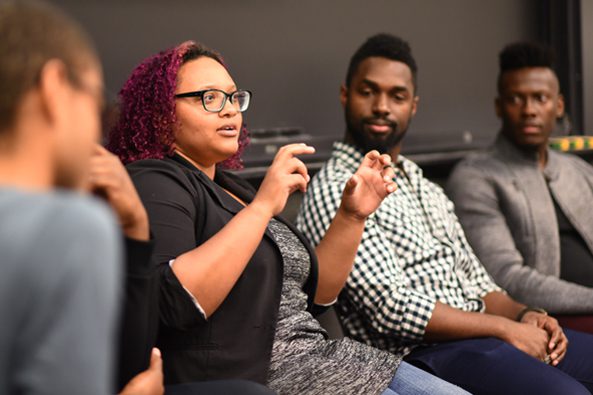What’s It Like to Earn Your MBA in Canada at McMaster’s DeGroote School?

Hockey, maple syrup, the friendliest people you’ll ever meet … all reasons to love Canada. But have you ever thought to earn your MBA in Canada?
More often than not, when MBA candidates think about where to go to school, they tend to scour the U.S. for the best programs. Occasionally, they’ll expand their reach overseas to the top programs in the UK and Europe, but often Canada is overlooked; and that’s a mistake. Canada has become an international destination for MBA students looking for an affordable education with an excellent reputation.
Canadian MBA programs offer many of the same opportunities as U.S. programs, but with some surprising benefits. To get a better idea of what it’s like to go to school in Canada, we talked to Bach Dang, a ’19 MBA student at McMaster University’s DeGroote School of Business. Continue reading…
LA Small Business Growth, UCLA Time Management Advice, and More

Take a look at some of the top stories coming out of the Los Angeles business schools this week.
The Growing Role of the CIO – Wall Street Journal
Vijay Gurbaxani, professor of business and computer science at the the Paul Merage School of Business at the University of California, Irvine, recently sat down with Ben Fried, CIO at Google Inc., and the Wall Street Journal for a conversation on the changing role of the CIO in today’s companies. The conversation was led by Nikki Waller, WSJ bureau chief.
Gurbaxani discussed changing technology and its impact on business, particularly the importance of cultivating talent in machine learning. For companies to stay current and competitive, he says, they must perfect the art of gathering data and putting it to good use.
“If you fall behind your competitors in developing this new know-how and leveraging, you’re going to fall further and further behind,” Gurbaxani said. “So my message to you would be get out there in a hurry.”
To read more excerpts from the interview, click here.
Study: L.A.’s Small Businesses Optimistic About Growth – Los Angeles Business Journal
A recent survey, conducted by 1st Century Bank in a partnership with Beacon Economics, has showed positive signs for LA small business growth, which is projected to continue through the end of the summer.
The study, which surveyed 150 small businesses in 30 core industries, reported a number of findings that offer hope and a positive outlook for small business owners in Los Angeles. About 78 percent of businesses reported that they expected to see an increase in market demand, while 54 percent witnessed an increase in profit margins over the past six months. Nearly 56 percent of the businesses reported a boost in sales during that same period, and over 70 percent expected to see further increase during the next six months.

More than 70 percent of small business owners in LA are expecting even more growth within the next six month.
According to Beacon Economics research director Adam Fowler, small businesses are a crucial part of the Los Angeles economy and throughout the nation.
“If we don’t understand small-business sentiment,” he comments, “we can’t know the direction this important sector will be heading in … nor can we improve conditions for their success.”
Click here to learn more about the LA small business growth research and look at the complete report here.
Time Management for Startups: Entrepreneurs Act as if Future Hours Aren’t Worth Much – UCLA Anderson Review
While larger companies have become increasingly aware about the importance of time management in a hyper efficient work environment, the same may not be true for entrepreneurs. Upstarts in the business world are as notorious for breaking certain conventions as they are for cutting their teeth, putting in triple-digit hour work weeks to build companies from scratch. And the reason being, says UCLA Anderson‘s Charles J. Corbett, is that there isn’t enough research quite yet.
“I realized there wasn’t much out there,” Corbett said in a UCLA Anderson Review interview. “A lot of the issues that entrepreneurs face don’t come up in our core management studies.”
Alongside fellow UCLA Anderson and INSEAD professor Guillaume Roels, and University College London’s Onesun Steve Yoo, Corbett found that entrepreneurs have to think of time management in the terms of their future, rather than today. And the trick is to understand “net present value (NPV).”
“But, according to Corbett, Roels and Yoo, people, including entrepreneurs, aren’t very good at thinking about their time in the same way. When people think about the value of their time, they tend to think about its current value, today, and not the future ramifications of having that time today. Correctly anticipating those dynamics, ‘NPV thinking’ is particularly important for entrepreneurs with the ambition to grow their business.”
You can read more from the trio’s time management research here.
Harvard Talks Analytics, MIT Explores Diversity in Tech, and More – Boston News

Let’s explore some of the most interesting stories that have emerged from Boston business schools this week.
Should an Algorithm Tell You Who to Promote? – Harvard Business Review
Professor of human resource management Jeffrey T. Polzar published a fictionalized case study that illuminates the influential role that “people analytics” algorithms play in steering hiring managers to which hot new talent. In a recent interview with Harvard Business Review, Polzar said:
“The day after Anne’s farewell party, Aliyah met with Christine and Brad Bibson, a data scientist on the people analytics team. ‘We’ve just started looking at networks,” Brad said, ‘and we think they can reveal some useful information. These are network analyses based on Molly’s and Ed’s e-mail and meeting history at BBI. With their permission and without looking at the content of their e-mails or calendars, we analyzed who they had been in contact with across the firm over the past six months.'”
Explore more of the fictionalized case study here.
Diversity in Tech a “People Problem” In Need of a Management Solution – MIT Sloan Newsroom
The MIT Sloan Coders Club recently hosted the Black in Tech and Entrepreneurship panel, in which a group of five entrepreneurs and engineers “shared experiences and offered suggestions on what tech companies can do to diversify their workforces and diminish bias.” Adam Taylor, founder of news app Black, explains:
“It is a people problem. When you think about the people that are on your teams professionally, how would you hire someone to work with you every day for however long they’re with your company? You tend to hire people you’re comfortable with.”

Students Roderic Morris of Drift, Amal Hussein, Nana Essilfie-Conduah, and Adam Taylor / Photo via Mimi Phan
Read more about this diverse take on tech’s diversity issue here.
AI Knows What Customers Want, Transforms Supply Chains – D’Amore-McKim Blog
D’Amore-McKim’s distinguished professor of supply chain management Nada Sanders uses Spanish “fast fashion” company Zara as the shining example of an optimized supply chain that uses artificial intelligence to drive customer satisfaction. In fact, many other businesses have begun to crib notes.
“Seven-Eleven Japan has taken lessons from Zara, using technology to microsegment demand and to understand what customers want. They will literally reshuffle and change what the merchandising looks like in the course of one day, in one location, for different segments of customers.”
Read more about professor Sanders’ research here.
Babson Reveals New Scholarships, Rankings, for Blended Learning MBA – MetroMBA
MetroMBA recently spoke with F.W. Olin Graduate School of Business faculty director Phillip Kim about the shape of the Babson Blended Learning hybrid online MBA program, shortly after the school earned some high praise from the likes of the Financial Times.
“Our program integrates the best of the ‘full-time’ graduate experience with a delivery format designed for working professionals, whose time is at a premium. Our students can complete their MBA in 21 months while working full-time. They learn from accomplished faculty, who are experts in their own disciplines and translate academic concepts into practical takeaways for our students. We are also the number one school for entrepreneurship education, and this ethos is infused throughout the program.”
Read more of our interview with Kim here.
The Value of Choosing a Research-Focused MBA Program at UW Foster

How important is faculty research to choosing your MBA program? Should you care if you go to a research university or is it all just white smoke? Is there value in choosing a research-focused MBA program?
We know that faculty matter. According to a paper written by researchers at Indiana University and Michigan State University titled “Faculty Do Matter: The Role of College Faculty in Student Learning and Engagement,” faculty have a significant impact on student learning and the overall educational experience.
“The impact that a faculty member can have on the student experience can be seen in and out of the classroom,” the study explained. “We found that faculty behaviors and attitudes affect students profoundly, which suggests that faculty members may play the single-most important role in student learning.”
But what about faculty research, is it important? Continue reading…
Here Are The 7 Hardest MBA Admissions Interview Questions

Clear Admit recently explored seven of the hardest MBA interview questions you may encounter, with helpful tips on how to handle them.
We recently shared our list of the most commonly asked MBA admissions interview questions, along with extensive advice on how to approach such queries. In light of the popularity of that piece, we’ve decided to up the ante this time around and spend some time deconstructing the absolute worst, totally unfair, just all-around-tough MBA admissions interview questions.
How did we do this, you ask? We called on three members of our team—all of whom have significant admissions experience at top schools—to comb through our extensive Clear Admit MBA interview archive and hand pick a set of particularly challenging questions. The only ground rule was that they needed to be questions posed to applicants with some degree of regularity, as opposed to one-off, oddball questions from an ‘off the reservation’ alum.
Arriving readily enough at a set of incredibly tough questions, our team of former admissions officers then crafted extensive guidelines on how to approach each one.
WARNING: Some questions on the list appear very sweet and innocent. Be aware that looks can be deceiving.
If you’re preparing for an upcoming interview, you won’t want to miss this valuable insider advice. It can help make answering even the most challenging questions feel like a walk in the park.
The Seven Hardest MBA Admissions Interview Questions
1. Describe a failure in which you were involved.
Why It’s Tough
Most candidates, when preparing for an interview, focus on the positive aspects of their story. They cannot wait to share their successes and highlight their strengths. So when asked directly to describe a failure, they can be unnerved at best and completely thrown at worst, especially if they haven’t given such a question any thought.
Key Considerations
The type of failure, the time frame of the failure and what you learned as a result will all be relevant in terms of addressing the question.
Risks:
- Picking a failure that is really just a veiled success story, i.e. not a real failure. “We missed one deadline (failure) but we shipped an outstanding product (success).” This type of answer can be perceived as avoiding the question.
- Picking a failure that is so substantial, and recent, that the interviewer genuinely worries that you might make the very same type of mistake again—either due to incompetence or because you just simply haven’t had time to learn from it yet.
Planning Your Response
Make sure you prepare to address a real failure that you played a part in and acknowledge your direct role. While the failure should be substantial, it should not be catastrophic to an organization. Address the process you went through in terms of deconstructing the failure and how you have learned from the experience. Finally, discuss a more recent success that demonstrates your use of the lessons learned from the earlier failure.
2. What other schools are you applying to?
Why It’s Tough
Many professionals in the admissions community feel that this question is simply unfair. There are several reasons for this, one of which is that applicants don’t really know how the answer is going to be used (more on this below). In addition, it’s not as though candidates are allowed to ask their interviewer about the other applicants the committee is considering…
Key Considerations
Fair or unfair, let’s unpack the purpose of the question a bit: Is it to determine your likelihood of attending the program you are interviewing for? Is it to assess whether you are ambitious in terms of school selection or more conservative? Is it simply to see if your list of target schools makes sense and demonstrates a thoughtful approach on your part? Any or all of these options are possible depending on the school interviewing you.
In most instances where this question is used, it is being asked by schools that are concerned about their yield. They want to avoid admitting candidates that clearly will select another school when given the choice. That being said, there are admissions interviewers who ask this question merely to better understand your approach to selecting target schools—and to determine whether you are simply applying to schools ranked in the top 10 or have a more nuanced approach. Regardless, you should prepare a solid answer.
Planning Your Response
There are three parts to addressing the question. First, you do want to be honest even if the question feels unfair. Second, as you list your schools, explain why you chose them. You want to demonstrate that your selections are thoughtful ones resulting from thorough research and careful consideration of your career plan, preferred teaching methods, campus environment, etc. Finally, should make the case for why the school you are interviewing with is a very excellent choice among the group of schools you’ve listed—citing specific elements of the program that fit well with the criteria that drove your overall school selection.
3. Describe a conflict at work and your role in it.
Why It’s Tough
It can be hard to discuss conflict without taking sides or painting some of your colleagues (or yourself) in a negative light. It can also be dangerous to highlight a conflict and appear detached from it—e.g. downplaying your role—because that could suggest either that you did nothing to stop it or that you simply aren’t important enough at work to have played a role/taken a side. In short, this kind of question is loaded with “damned if you do, damned if you don’t” issues.
Key Considerations
A common question in an MBA interview will look at how you handle conflict, and usually conflict at work. Schools ask this question to test your emotional intelligence and to see how you talk about your peers, your bosses, your organization, etc. Even the slightest whiff of “throwing someone under the bus” can backfire. It’s also important to showcase your ability to see the various sides of a conflict.
Preparing Your Response
It makes sense to prepare a particular conflict you have had at work and be ready to use the example. A strong response to this question needs to show your role in the conflict, who it was with, how it was addressed (if, in fact, it was addressed) and what the result was. Equally as important will be to share what you learned from the experience and how a subsequent situation at work was resolved positively or avoided altogether as a result of what you learned.
Tech Grads Surge in New Northwestern Kellogg Employment Report

The Kellogg School of Management released new employment data and statistics from the Class of 2017. According to the school, 94 percent of Kellogg’s full-time MBA Class of 2017 received an offer within three months of graduation.
“Kellogg leaders take a multidisciplinary approach to solving complex business challenges,” said Matt Merrick, Associate Dean of MBA Operations. “The versatile skills they hone at Kellogg enable them to make an immediate impact across all types of organizations.”
MBAs were hired by a wide variety of companies across all disciplines and industries, shapes and sizes. Some of the top companies hiring Kellogg students include McKinsey & Company, The Boston Consulting Group, Amazon, Bain & Company, and Microsoft.
Employment data shows that the most popular industries were consulting (33 percent), technology (25 percent), finance (13 percent) and CPG (12 percent). The Kellogg Career Management Center helped students establish relationships with more than 50 technology companies in order to help secure these employment opportunities. Overall, the Career Management Center works with employers to create custom recruiting strategies, forging deep relationships with employers of all sizes, from all industries and regions.
According to our sister site Clear Admit, the 25 percent of Kellogg grads that landed jobs in the technology industry was a school record.
Jeanette Brown writes:
“Amazon hired 32 Kellogg grads, making it the third largest recruiter in 2017, behind only McKinsey and Boston Consulting Group (BCG). But Amazon was far from the only tech firm to hire at the school. ‘It’s not only the big employers like Amazon, Apple, Google—but the small companies as well, the ones that hire just one to two MBAs,’ explains Liza Kirkpatrick, Senior Director of the full-time MBA program at Kellogg’s Career Management Center. ‘We had over 50 unique tech employers that hired our students this past year, which demonstrates that we really have that depth.’ Kirkpatrick further noted that the types of jobs for which tech firms are hiring Kellogg grads is widely varied, including product management, sales, marketing, business operations, supply chain, product development, and others.”
Kirkpatrick notes that the surge in tech jobs stems from a concerted effort from the business school, which was also reflected in the number of technology industry internships for the Class of 2018.
“‘We started developing relationships in the tech space many years ago,’ acknowledges Kirkpatrick. ‘It has taken a while for firms to recognize that when an MBA comes on board, it really adds value.’ But they certainly have, which can also be seen reflected in the number of tech firms that now take on summer interns. ‘They have really organized themselves to bring on an MBA class as interns as a result,’ Kirkpatrick adds. The most recent employment report reveals that 26 percent of the Class of 2018 interned at technology firms.”
In a press release from the school, Jodi Washington, a Program Manager for the Networking and Security Transformation team, said, “Kellogg’s curriculum builds leaders who are strong analytical thinkers and are confident collaborating across organizations. The Kellogg graduates we hire jump in on day one, but also continue to mature at Cisco.”

2017 statistics/photo courtesy of Northwestern Kellogg.
The statistics show that the number of Kellogg MBAs to accept job offers on the West Coast has also increased (31.4 percent) from last year, a direct correlation to uptick in tech hires. Meanwhile, 30 percent of 2017 MBAs stayed in the Midwest and 33 percent accepted jobs on the East Coast.
You can read more on Kellogg’s latest employment stats and the Clear Admit interview with Kellogg Senior Director of Career Management Liza Kirkpatrick here.
